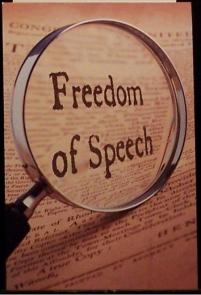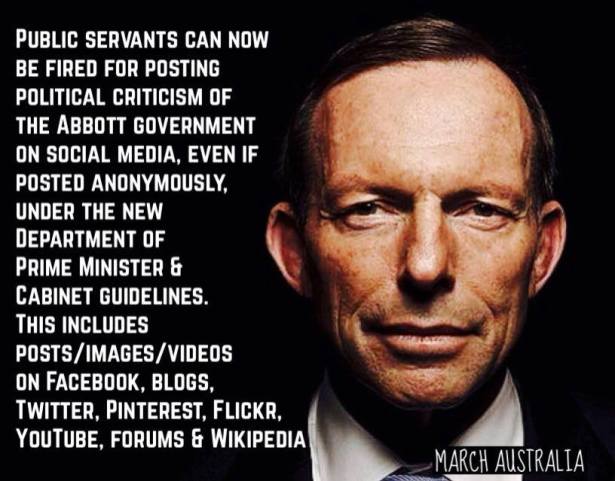Over the weekend it was revealed that new guidelines from the department of Prime Minister and Cabinet threaten employees with discipline if they are “critical or highly critical of the department, the minister or the Prime Minister” on Facebook, Twitter, Youtube, Pinterest, Flickr, blogs or any other social media outlet. This includes posts made in a personal capacity and even those made anonymously and public servants are also urged to dob in colleagues they might recongnise.
If it wasn’t so terrifying it would sound incredibly elementary, wouldn’t it? It reminds me of a punitive teacher controlling the science lab.
But the fact is it is both terrifying and hypocritical.
In a speech at the Institute of Public Affairs in 2012, Abbott said:
“There is no case, none, to limit debate about the performance of national leaders. The more powerful people are, the more important the presumption must be that less powerful people should be able to say exactly what they think of them”.
Well it seems he has a different tune now that he is that ‘more powerful person’.
These new codes of conduct seem contrary and in opposition to the current war on freedom of speech; namely the repeal of Section 18C of the Racial Discrimination Act.
Introduced in 1994 as a “safety net for racial harmony”, it makes it unlawful to offend, insult, humiliate and intimidate someone based on their racial or ethnic origins.
Senator Brandis says that the problem with the law is that it deals with racial vilification in “the wrong way” by “political censorship”. He then goes on to say, “People have a right to be bigots, you know”.
Prime Minister Abbott chimed in saying, it was “in the nature of free speech that sometimes some people will not like it”. But in his case, he can threaten people whose free speech he does not like. Which brings me to my point.
Although free speech is believed to be a basic democratic virtue, this should not remove the fact that not everyone in society has an equal footing in order to assert that free speech. Those with an obvious platform (typically white males) will have the same freedom of expression as the Sri Lankan asylum seeker, which in theory looks and sounds perfectly egalitarian. But what freedom of expression does aSri Lankan asylum seeker for example, have when he is living in squalor in Western Sydney, barely able to offering a morning greeting let alone defend himself against racial vilification by politicians and journalists alike?
Waleed Aly writes a compelling piece where he describes it as; “the whitest piece of proposed legislation I’ve seen during my lifetime”. I urge you to read this to understand the full impact of the legislative changes.
So between improving freedoms to express opinions that hurt and degrade minority groups and silencing public servants from having political opinion, I am sure I am not the only one in a head spin about what the Abbott Government is actually standing for. Progressive Egalitarian Freedom of Speech or Totalitarian rule of law protecting the public image of the Government?
But one thing is clear; Tony Abbott understands the power of words to create worlds and to destroy individuals. Silence is a powerful alley to the very thing we may in fact be in objection to.
I was always taught as a kid to use my words to ‘say nice things’. Perhaps as an adult, saying nice things should now expand to include ‘speak out against not nice things’.

